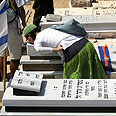
"The Gush Katif cemetery area will be closed off when the graves are opened," he said. "We'll strive to hold each funeral the same day as the removal, but the families will have the right to decide otherwise."
Notably, the Gush Katif cemetery contains 48 graves, including those of three IDF soldiers.
During the briefing, also attended by IDF Chief Rabbi Yisrael Weiss, the officers did not say how many families have already gave their blessing to the removal of graves. The army rabbi said that "if the area is hit by fire we will not risk the life of one soldier, and will wait until the mission can be accomplished."
Stern said the army believes evacuated Gaza families would strive to finish the grave removal operation as quickly as possible and not feel they left relatives behind in Gush Katif.
"We are talking about one of the most sensitive, complex missions the IDF has been tasked with," he said. "If we carried out the evacuation of residents with sensitivity, there is no limit to the sensitivity required from us now."
Some families want loved ones to be buried in capital
Stern added that an IDF team was assigned to accompany each family who has a relative buried in Gush Katif.
"We'll accompany the families all along the way," he said, and added graves will be transferred to a new location in accordance with the families' request.
"Some of them are asking to transfer the graves to Jerusalem, because they view Jerusalem as a place of special holiness," Stern said.
Rabbi Weiss, meanwhile, said that at first he thought the army should not be tasked with the heavy burden of removing the graves, but later changed his mind.
"Today, as we face this holy mission, I understand there is no organization that can undertaken this mission," he said, and noted there was not even one soldier who refused to take part in the removal of graves, after it was backed by leading rabbis.
"We pledge not to leave anything in the grave, not only the deceased, but also the soil around them, in accordance with Jewish law," he said. "One ambulance will take the deceased, and the one behind it with carry the soil."















